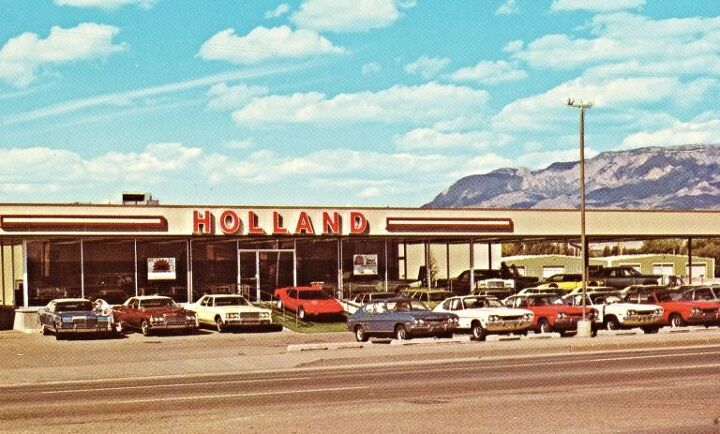Dealer Advisor: Prepare for the Worst or Be Destroyed Over the Next Two Decades

Dealership advisory firm Presidio Group has painted a very bleak picture for its clients. With analysts predicting a downturn in auto sales, the company recommends dealers establish a robust 20-year plan that will enable them to perform in the new climate or get out of the business entirely.
Brodie Cobb, founder of Presidio Group, cites a glut of studies claiming dealerships will struggle as manufacturers shift into mobility companies and alternative modes of transportation are more broadly encouraged.
“We’re not particularly pleased that the world is changing the way it is. We would rather have it stay the same, because owning dealerships is a very nice return and profitable business that we enjoy very much,” Cobb told Automotive News in an interview. “So when we talk about this, it hurts us, too. We, too, need to understand the future, form a plan and not just put our head in the sand and hope it goes away.”
However, we’re of the mind that the situation’s direness may be overhyped. For most Americans, ride-hailing simply isn’t an option. A recent AAA Foundation for Traffic Safety study showed that using ride-hailing services exclusively is often more expensive than owning a modestly priced vehicle for most individuals. It’s a situation that’s unlikely to change any time soon and, even if it does, there’s still the question of convenience for those living outside the metropolitan hubs where ride-sharing vehicles typically reside.
National Automobile Dealers Association Chairman Wes Lutz, president of Extreme Chrysler-Dodge-Jeep-Ram in Jackson, Michigan, noted the AAA research during a speech at last month’s Automotive Press Association in Detroit. “People are going to continue doing exactly what they’re doing now: owning a car or truck for day-in and day-out personal transportation and using ride-hailing services when it makes more sense than driving,” Lutz said. “That’s not a revolution. That’s an evolution.”
NADA’s figures presume the number of physical shops in North America will still decline, though. The association figures the number of U.S. dealerships would drop to about 16,500 in 2025 from 18,000 in 2016.
Presidio is less optimistic, operating under the assumption that vehicle ownership will be largely replaced by mobility-based alternatives in the coming years.
From Automotive News:
Presidio relied on several forecasters in its annual market report published in September.
Morgan Stanley analyst Adam Jonas said in November 2017 that he thinks the 10,000 North American dealers could eventually be reduced to “as few as 10 monolithic mega-fleet managers” amid technology disruption, regulatory changes and a future of shared autonomous vehicles. Jonas put the number of U.S. dealerships down to about 10,000 by 2035.
Global audit firm KPMG said in January that more than half of auto and tech executives surveyed around the world expect the number of dealerships to decline 30 to 50 percent by 2025.
Dale Pollak, executive vice president of Cox Automotive, suggested this year at a conference that the number of U.S. dealerships could fall to just 30 owners. Today he calls that figure “too extreme” though it’s unclear why he adjusted his prediction. Pollak now says he could see the number of owners in 2034 dropping to 200 to 300 for maybe 9,000 dealerships.
Presidio is basically asking clients to get out of the business or rework their model to account for a future where service, finance, and insurance profits will be much less robust. Cobb believes the future will revolve around large fleets of corporate-owned autonomous vehicles that customers will perpetually rent, rather than purchase, for themselves. “And you just don’t need the big, huge auto retail channel that we have today with dealerships and consumers purchasing and trading and servicing cars because they’re not going to own them,” he said.
That kind of work would leave smaller businesses at a major disadvantage, leaving Presidio to recommend selling. While this would likely benefit the firm financially, since it oversees dealership transactions on the regular, fewer dealerships in existence would give it less business in the automotive sector in the long term.
“The rest we think should consider monetizing, selling these really valuable assets that in many cases, in most cases, have been built up over decades, sometimes generations,” Cobb continued. “Because at some point, when autonomy is more broadly accepted, the value of those businesses will decline sharply, because it will be a shrinking business and investors don’t typically like to invest in shrinking businesses.”
While dealerships will have to adapt to the changing landscape and should modernize, it’s hard to commit to any obvious timeline for their demise. Autonomous vehicles have yet to prove themselves as an effective replacement for ownership, yet Cobb talks about how they’ll soon turn brick-and-mortar car stores into the next Blockbuster Video. That might be the case, but we’d like to see more supporting evidence. Right now, it seems highly speculative and primarily dependent upon the industry’s own narrative.
You’d be a fool to not pay attention, however, especially if you own a dealership.

A staunch consumer advocate tracking industry trends and regulation. Before joining TTAC, Matt spent a decade working for marketing and research firms based in NYC. Clients included several of the world’s largest automakers, global tire brands, and aftermarket part suppliers. Dissatisfied with the corporate world and resentful of having to wear suits everyday, he pivoted to writing about cars. Since then, that man has become an ardent supporter of the right-to-repair movement, been interviewed on the auto industry by national radio broadcasts, driven more rental cars than anyone ever should, participated in amateur rallying events, and received the requisite minimum training as sanctioned by the SCCA. Handy with a wrench, Matt grew up surrounded by Detroit auto workers and managed to get a pizza delivery job before he was legally eligible. He later found himself driving box trucks through Manhattan, guaranteeing future sympathy for actual truckers. He continues to conduct research pertaining to the automotive sector as an independent contractor and has since moved back to his native Michigan, closer to where the cars are born. A contrarian, Matt claims to prefer understeer — stating that front and all-wheel drive vehicles cater best to his driving style.
More by Matt Posky
Latest Car Reviews
Read moreLatest Product Reviews
Read moreRecent Comments
- Michael S6 Very confusing if the move is permanent or temporary.
- Jrhurren Worked in Detroit 18 years, live 20 minutes away. Ren Cen is a gem, but a very terrible design inside. I’m surprised GM stuck it out as long as they did there.
- Carson D I thought that this was going to be a comparison of BFGoodrich's different truck tires.
- Tassos Jong-iL North Korea is saving pokemon cards and amibos to buy GM in 10 years, we hope.
- Formula m Same as Ford, withholding billions in development because they want to rearrange the furniture.


































Comments
Join the conversation
The electric car revolution will speed things up. EVs are basically like big household appliances, that could be bought (ordered) at your electronics shop, a Pep Boys or a retailer like for instance IKEA.
Anyone claiming autonomous vehicles will be here any time soon also has oceanfront property in Montana to sell you. It's a complete joke